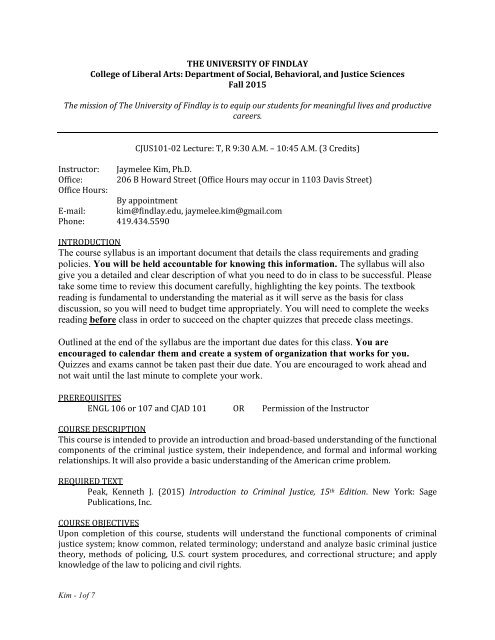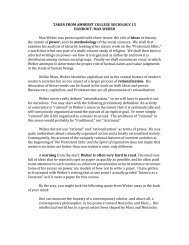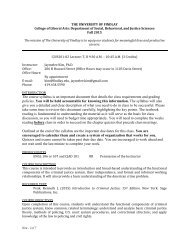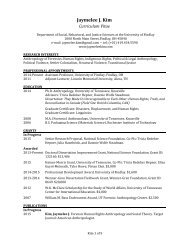o_19qj7vs90uq4bjc1hub1l4513qna.pdf
Create successful ePaper yourself
Turn your PDF publications into a flip-book with our unique Google optimized e-Paper software.
THE UNIVERSITY OF FINDLAY<br />
College of Liberal Arts: Department of Social, Behavioral, and Justice Sciences<br />
Fall 2015<br />
The mission of The University of Findlay is to equip our students for meaningful lives and productive<br />
careers.<br />
CJUS101-02 Lecture: T, R 9:30 A.M. – 10:45 A.M. (3 Credits)<br />
Instructor: Jaymelee Kim, Ph.D.<br />
Office: 206 B Howard Street (Office Hours may occur in 1103 Davis Street)<br />
Office Hours:<br />
By appointment<br />
E-mail: kim@findlay.edu, jaymelee.kim@gmail.com<br />
Phone: 419.434.5590<br />
INTRODUCTION<br />
The course syllabus is an important document that details the class requirements and grading<br />
policies. You will be held accountable for knowing this information. The syllabus will also<br />
give you a detailed and clear description of what you need to do in class to be successful. Please<br />
take some time to review this document carefully, highlighting the key points. The textbook<br />
reading is fundamental to understanding the material as it will serve as the basis for class<br />
discussion, so you will need to budget time appropriately. You will need to complete the weeks<br />
reading before class in order to succeed on the chapter quizzes that precede class meetings.<br />
Outlined at the end of the syllabus are the important due dates for this class. You are<br />
encouraged to calendar them and create a system of organization that works for you.<br />
Quizzes and exams cannot be taken past their due date. You are encouraged to work ahead and<br />
not wait until the last minute to complete your work.<br />
PREREQUISITES<br />
ENGL 106 or 107 and CJAD 101 OR Permission of the Instructor<br />
COURSE DESCRIPTION<br />
This course is intended to provide an introduction and broad-based understanding of the functional<br />
components of the criminal justice system, their independence, and formal and informal working<br />
relationships. It will also provide a basic understanding of the American crime problem.<br />
REQUIRED TEXT<br />
Peak, Kenneth J. (2015) Introduction to Criminal Justice, 15 th Edition. New York: Sage<br />
Publications, Inc.<br />
COURSE OBJECTIVES<br />
Upon completion of this course, students will understand the functional components of criminal<br />
justice system; know common, related terminology; understand and analyze basic criminal justice<br />
theory, methods of policing, U.S. court system procedures, and correctional structure; and apply<br />
knowledge of the law to policing and civil rights.<br />
Kim - 1of 7
INSTRUCTIONAL STRATEGIES<br />
Primary instructional strategies include archival research, presentation/project, group work,<br />
reading, lecture, and discussion.<br />
METHODS OF ASSESSMENT<br />
If accepted late, assignments will receive a 10% deduction for each day late. Any assignments<br />
submitted digitally should still have a formal heading with name, date, course name/number, etc. If<br />
the assignment is multiple pages, they should be labeled with last names and page numbers (e.g. Kim<br />
1 of 2).<br />
Exams<br />
There will be four exams throughout the semester that are each worth 100 points. These exams are<br />
not cumulative. If you will not be able to take the exam, the instructor must know at least one week<br />
in advance. Reason for missed exams must be university-approved/accepted (e.g. illness with<br />
doctor’s note, academic conference, athletic commitment).<br />
Final Exam<br />
There will be a cumulative final exam that is worth 100 points. The final exam is optional and<br />
intended to replace your lowest test grade or a missed exam.<br />
Weekly Quizzes<br />
Each chapter has a reading assignment called a chapter quiz. Each quiz is worth 10 points and must<br />
be completed before or on the date on the syllabus. The quizzes are based on the textbook reading<br />
assignments for that week.<br />
Presentation<br />
Each student will participate in one group presentation that is worth 60 points. The topic of the<br />
presentation will be assigned by the instructor. The presentations will be divided over three<br />
presentation dates throughout the semester.<br />
GRADES<br />
Exams* (100 x 4) 400 pts<br />
Weekly Assignments (10 x 14) 140 pts<br />
Presentation<br />
60 pts<br />
Total<br />
600 pts<br />
*A fifth exam, the final, is optional and will replace your lowest test score from one of the 4 section<br />
exams.<br />
COMMUNICATION & WRITING<br />
E-mails are expected to be written in a professional manner. The subject line should read:<br />
“CJUS101.02 Last Name – Topic.” There should be proper salutations, grammar, and<br />
punctuation.<br />
Citation style should be in the format of the APA for any written assignments.<br />
Written assignments must be treated as a formal document, and written with at least the<br />
same level of care as would be used for an English course. Complete sentences, proper<br />
grammar, and correct citation are imperative. Failure to do so can result in failure of the<br />
assignment.<br />
COURSE SPECIFIC POLICIES AND PROCEDURES<br />
Cellular phones and photography are prohibited.<br />
Kim - 2of 7
Computers may only be used with permission of the instructor.<br />
Recording is prohibited without the permission of the instructor.<br />
Respect is of the utmost importance.<br />
E-mails are expected to be written in a professional manner.<br />
The subject line should read: FORS201.01 Last Name – Topic<br />
There should be proper salutations, grammar, and punctuation.<br />
Citation style for written assignments should be in APA format.<br />
UNIVERSITY-WIDE POLICIES AND PROCEDURES<br />
Grading Scale<br />
A 4.0 93-100<br />
C 2.0 73-76<br />
A- 3.67 90-92<br />
C- 1.67 70-72<br />
B+ 3.33 87-89<br />
D+ 1.33 67-69<br />
B 3.0 83-86<br />
D 1.0 63-66<br />
B- 2.67 80-82<br />
D- 0.67 60-62<br />
C+ 2.33 77-79<br />
F 0 60-0<br />
University Honor Code<br />
Each and every student of the University will adhere to the following Honor Code:<br />
“I will not knowingly engage in any dishonorable behavior, cheat, steal, lie, or commit any act of<br />
plagiarism during any academic work, course, or endeavor. If I observe an act which I believe<br />
violates the University’s Honor Code, I may, at my discretion, report it to the appropriate<br />
personnel.”<br />
Student Acknowledgement of University Honor Code<br />
“I acknowledge that I have fully complied or will comply with all aspects of the University’s Honor<br />
Code in submitting work.”<br />
Student Rights and Responsibilities Statement, Article VII-Academic Integrity<br />
www.findlay.edu/offices/student/Documents/Student%20Rights%20and%20Responsibilities%20<br />
statement.<strong>pdf</strong><br />
Special Services<br />
If you are a student with a disability, it is your responsibility to inform your instructor and register<br />
with the Office of Disability Services (ods@findlay.edu) at least one week prior to a needed service<br />
so reasonable accommodations can be made.<br />
Last Date of Attendance Policy<br />
Last Date of Attendance (LDA) Policy: A student's last date of attendance (LDA) is the date he/she<br />
was last present in class and/or completed a course assignment. This policy was enacted to<br />
document a particular date at which a student stopped attending or participating in a class. This<br />
date is determined by the instructor of the class. If a student fails to attend classes or complete<br />
assigned course work it is their responsibility to withdraw from the course. If the student does not<br />
withdraw from the course and is absent for a specified period of time, an instructor may choose to<br />
notify the student and/or the VPAA of the continued absence or lack of completion of academic<br />
course assignments. This is important because those students on financial aid are getting<br />
remuneration or attending classes – if they are not they should reimburse the institution according<br />
to the number of days between the LDA and their withdrawal from the course. If the student<br />
Kim - 3of 7
attends all classes yet fails the course, the official last date of the class, as determined by the<br />
institution, will be used for reporting purposes. In this course the date of the final exam.<br />
Specifically, failure to attend three consecutive classes during the semester will invoke the LDA<br />
policy and the date of the third absence will be used by the institution for reporting purposes.<br />
Course and Instructor Evaluation<br />
Each student is expected to complete the course and instructor evaluation which is sent<br />
electronically to the student by the Office of the Registrar. The electronic notification comes in the<br />
form of an e-mail from the UF Registrar’s Office with the following subject line: Online survey for<br />
the designated course (e.g. CJUS 101).<br />
The Instructor reserves the right to alter, amend, or deviate from the syllabus at any time.<br />
Kim - 4of 7
Week Topic(s) Readings Due<br />
BY<br />
Section 1: Foundations of Criminal Justice<br />
1<br />
Aug 18<br />
Aug 20<br />
2<br />
Aug 25<br />
Aug 27<br />
3<br />
Sept 1<br />
Sept 3<br />
4<br />
Sept 8<br />
Sept 10<br />
Section II: Police<br />
5<br />
Sept 15<br />
Sept 17<br />
6<br />
Sept 22<br />
Sept 24 (No<br />
Class)<br />
7<br />
Sept 29<br />
Oct 1<br />
Course Introduction,<br />
Foundations of criminal justice;<br />
crime control v. due process<br />
models; citizen responses to<br />
crime; the criminal justice<br />
process; the wedding cake model<br />
of criminal justice; discretion<br />
and ethics in criminal justice<br />
Foundations of law in the US;<br />
common law; civil v. criminal<br />
law; procedural v. substantive<br />
law; essential elements of a<br />
crime; felonies, misdemeanors;<br />
defenses<br />
Theories of crime (e.g., classical,<br />
positivist schools, psychological<br />
explanations, sociocultural<br />
explanations, feminist<br />
criminology, white collar crime);<br />
measurement of crime<br />
Ethics in criminal justice (e.g.,<br />
the police, the courts, federal<br />
employees, corrections)<br />
Sept 10: Exam 1<br />
Police organizations; English<br />
roots; policing eras in the US;<br />
federal agencies, state agencies,<br />
local and municipal agencies;<br />
private policing<br />
Patrol functions; recruiting,<br />
training; working personality;<br />
basic tasks; patrol effectiveness;<br />
traffic functions; police<br />
discretion; community policing;<br />
forensics<br />
Challenges in policing; use of<br />
force in policing; civil liability;<br />
recruiting women and<br />
minorities; police technologies<br />
Aug 20: Ch. 1<br />
Aug 23: Ch. 2<br />
Aug 30: Ch 3<br />
Sept 6: Ch 4<br />
Sept 13: Ch 5<br />
Sept 20: Ch 6<br />
Sept 27: Ch 7<br />
Assignments Due ON<br />
Aug 20: Ch1 BB Quiz<br />
Aug 23: Ch2 BB Quiz<br />
Aug 30: Ch3 BB Quiz<br />
Sept 6: Ch4 BB Quiz<br />
Exam 1 covers materials<br />
presented in class as well<br />
as those in chapters 4-7<br />
Sept 13: Ch5 BB Quiz<br />
Sept 20: Ch6 BB Quiz<br />
Sept 24: No Class<br />
(independent<br />
presentation work and<br />
research day)<br />
Sept 27: Ch7 BB Quiz<br />
Oct 1: Presentation Set 1<br />
Kim - 5of 7
8<br />
Oct 6 (No Oct 6: No Class – Fall Break<br />
Class – Fall<br />
Break)<br />
Oct 8: Exam 2<br />
Oct 8<br />
Section III: The Court and Criminal Procedure<br />
9<br />
Oct 13<br />
Oct 15<br />
Arrest, search, and seizure; the<br />
Fourth Amendment; Fifth<br />
Amendment; Sixth Amendment<br />
Oct 11: Ch 8<br />
Exam 2 covers materials<br />
presented in class as well<br />
as those in chapters 5-7<br />
Oct 11: Ch8 BB Quiz<br />
10<br />
Oct 20<br />
Oct 22<br />
11<br />
Oct 27<br />
Oct 29<br />
Court organization; colonial<br />
courts; inside the courts; trial<br />
courts; the pretrial process; trial<br />
process; state courts; federal<br />
courts<br />
Judges and attorneys; judicial<br />
selection; judicial benefits and<br />
problems; courtroom civility;<br />
prosecutors; defense attorneys<br />
Oct 18: Ch 9<br />
Oct 25: Ch 10<br />
Oct 18: Ch9 BB Quiz<br />
Oct 25: Ch10 BB Quiz<br />
Oct 29: Presentation Set<br />
2<br />
12<br />
Nov 3<br />
Nov 5<br />
Sentencing and punishment;<br />
purposes of punishment; types of<br />
sentences; federal sentencing<br />
guidelines; victim impact<br />
statements; aggravating and<br />
mitigating circumstances;<br />
criminal appeals, technologies<br />
used in courts<br />
Nov 1: Ch 11<br />
Nov 1: Ch11 BB Quiz<br />
Exam 3 covers materials<br />
presented in class as well<br />
as those in chapters 8-11<br />
Nov 5: Exam 3<br />
Section IV: The Correctional System<br />
13<br />
Nov 10<br />
Nov 12<br />
Correctional structures and<br />
functions; jails and prisons; state<br />
and federal level facilities;<br />
supermax prisons; technologies<br />
in corrections<br />
Nov 8: Ch 12<br />
Nov 8: Ch12 BB Quiz<br />
Kim - 6of 7
14<br />
Nov 17<br />
Nov 19<br />
(ONLINE<br />
assignment –<br />
No Class<br />
Meeting)<br />
15<br />
Nov 24<br />
Nov 26 (No<br />
Class<br />
Thanksgiving)<br />
Correctional inmates; jail and<br />
prison personnel; governance;<br />
prisoner litigation; specialized<br />
populations (e.g., females,<br />
mentally ill, prison gangs, death<br />
row); constitutional rights;<br />
prison deprivations;<br />
prisonization<br />
Community corrections;<br />
probation and parole; origins;<br />
functions; eligibility; rights;<br />
intermediate sanctions;<br />
restorative justice<br />
Nov 15: Ch 13<br />
Nov 22: Ch 14<br />
Nov 15: Ch13 BB Quiz<br />
Nov 19: BB Assignment<br />
#2<br />
Nov 22: Ch14 BB Quiz<br />
16<br />
Dec 1<br />
Dec 3<br />
Dec 1: Presentation Set 3 &<br />
Review<br />
Dec 3: Exam 4<br />
Exam 4 covers materials<br />
presented in class as well<br />
as those in chapters 12-<br />
14<br />
Dec 1: Presentation Set 3<br />
Kim - 7of 7
















